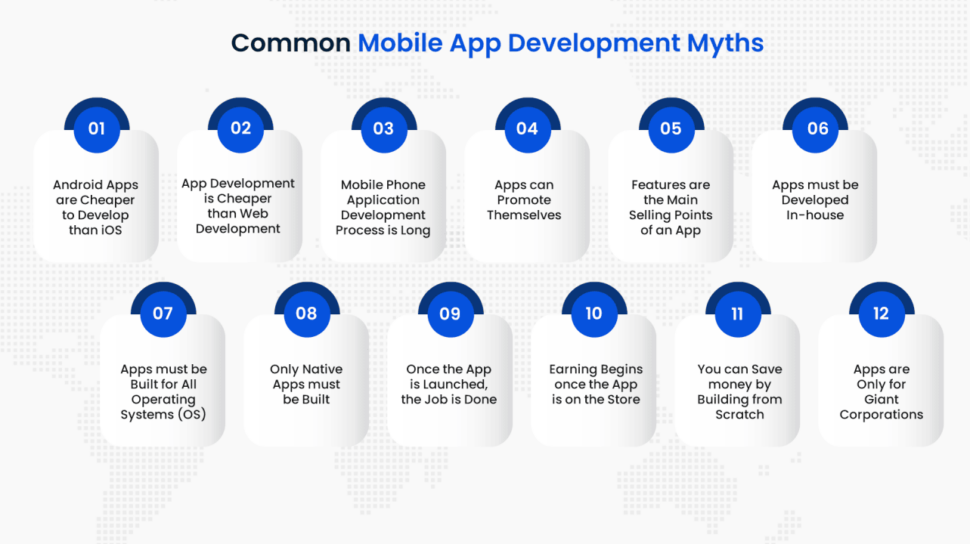As mobile apps and new trends gain prominence, companies and entrepreneurs often encounter misconceptions about the dos and don’ts of app development. It’s crucial to note that the app development process is vital for businesses, and exposing these myths is essential.In this blog, we’ll uncover common mobile app development myths to ensure you’re well-informed and can make informed decisions. Let’s get started.
Common Mobile App Development Myths
Below are some common mobile app development myths we are about to bust.

Myth 1 – Android Apps are Cheaper to Develop than iOS
A common misconception regarding mobile applications is the belief that Android app development should come at a lower cost compared to iOS. Nevertheless, developers proficient in app development can create both Android and iOS apps within similar price ranges.
Note: Please be aware that if you seek a budget-friendly solution compatible with both Android and iOS, opting for a cross-platform approach is the optimal choice.
Myth 2 – App Development is Cheaper than Web Development
While some may think that developing apps for mobile devices are cheaper due to their smaller size, it’s important to understand that app development is just as complicated as creating websites or web platforms, and in some cases, even more so. Apps require multiple programming languages, frameworks, integrations, and both frontend and backend tools to function seamlessly.
Myth 3 – Mobile App Development Is A Simple Process
Creating a mobile app is often thought to be a simple process that can be completed within a few days. While developers can build basic web-based apps in a short time, developing high-quality and sophisticated mobile applications that offer valuable features takes a longer and more intricate process.
Myth 4 – Mobile Phone Application Development Process is Long
Many believe that developing a custom mobile app takes years, but it can actually be simplified with the right team, strategy, objectives, and requirements. For instance, at Ailoitte, we follow a process for time-sensitive solutions: Plan a solid business model, address legalities and testing criteria, create a product roadmap, build a prototype, and thoroughly test its functionality, efficiency, and performance before launching the beta version.
Myth 5 – Technology Is A Must For Mobile App Development
Individuals without a technical background may not view technology as the foundation for a startup. While technology serves as a facilitator, ideas serve as the fundamental driver for growth and advancement. By recruiting individuals with expertise in the field, it becomes feasible to develop a tech product even without being a hacker.
Myth 6 – Apps Can Promote Themselves
In a crowded app market, advertising is crucial to grab your audience’s attention. To stand out, it’s essential to find the right team to promote your app on platforms that reach the target audience based on their interests and demographics. Once this setup is in place, you can retarget people who haven’t downloaded your app using demographics, interests, and location.
Myth 7 – Features are the Main Selling Points of an App
While designing your app, standout features are important, but the key is to emphasize how your app solves customer problems compared to others. The focus should be on delivering a great UI/UX experience and making a real difference for the user, rather than just showcasing features. Dedication to user experience and meaningful features makes your app sought-after, easy to use, and visually appealing.
Want to develop a feature-rich app? Contact Us
Myth 8 – Apps must be Developed In-house
As the demand for apps grows, many businesses join the app market. Instead of hiring an in-house team, which can be time-consuming and expensive, outsourcing app development is often a more efficient option. It saves costs, allows for a quick and hassle-free app development process, and partners with a mobile app development company to ensure a high-quality app tailored to specific needs.
Myth 9 – Apps must be Built for All Operating Systems (OS)
Before creating an app for your business, research your audience to know their smartphone preference (Apple or Android), the region they’re in, and the apps they use and why. Build the app based on their OS platform—both if they use both, or just one if that’s their preference. This targeted approach saves time and money in app development.
Myth 10 – Only Native Apps must be Built
When designing a mobile app, you might hear advice to choose a Native version, but consider that a cross-platform app works on different types of devices, not just one. It uses the same code for smartphone development, reaching a wider audience in less time and budget. Plus, the app maintains a consistent look and feel on all devices for a better user experience.
Also read – Native vs. Cross-platform app development: 12 key features
Myth 11 – Once the App is Launched, the Job is Done
After launching an app, some businesses think the work is done, but it’s an ongoing process. Continuous efforts are needed for success, including fixing bugs, adding features, addressing user feedback, staying updated on industry trends, and marketing to boost downloads. This ongoing commitment ensures the app remains in the market for the long term.
Myth 12 – Earning Begins once the App is on the Store
Many people think that just launching an app guarantees earnings, but it’s not that simple. Downloads alone don’t ensure revenue. To make money, you might need to use various methods like offering free/paid versions, in-app purchases, advertising, monetizing app data, or affiliate marketing. It’s not just about downloads; it’s about how you monetize your app.
Myth 13 – You can Save money by Building from Scratch
Some businesses believe building an app from scratch saves money and time, but that’s not always true; it can be more expensive. If you need specific features and a quick solution, buying a ready-made one might be more practical. Sometimes, the features you want are already available in open-source libraries, making it unnecessary to start from scratch. Before deciding, consider your team’s skills, feature needs, development time, and costs.
Myth 14 – Apps are Only for Giant Corporations
Many assume that apps are only for huge enterprises, but this is untrue. Anyone can create and own an app with a good idea, potential, and market. Many mobile app development firms cater to both small and large enterprises, making it accessible for anyone to get an app developed through proper collaboration.
Myth 15 – Legacy systems do not support data storage for applications
Big companies have invested heavily in systems like ERP (Enterprise Resource Planning) and want mobile apps to smoothly connect with various technologies. However, connecting mobile apps to backend systems like Oracle, MySQL, and SAP can be challenging, slowing down development or making apps hard to use. Using an MBaaS solution with API infrastructure resolves these issues, making it easy for mobile devices to access legacy systems.
Looking to develop an app for your business? Contact us for a quote
Summing Up
Creating a mobile app involves teamwork, and this blog is here to dispel myths about app development so you can build a user-friendly app that generates revenue. At Ailoitte, we’re a reliable mobile app development company offering affordable, top-notch services.
We’re here to support you and ensure you avoid common misconceptions. Our expertise spans various domains, providing cutting-edge solutions from app development to maintenance, helping your app grow. Partner with Ailoitte to bring digitalization to your business through the right technology and innovation.
FAQ
The biggest myths about mobile apps are apps are expensive to create, are only for large corporations, development is costly and long, no marketing is needed after the launch, the app must support all OS, development is a one-time affair, Android apps are cheaper to develop than iOS apps and earning begins once the application is on the respective app store.
Risk identification is the most important stage in project risk management. It determines the possible hazards that can affect the successful launch and development of the project. For example, it can be: IT security threats (malware and ransomware) Long app reviewing time.
Mobile app development challenges are developing a world-class app, finding compatibility with specific devices and technology, failing to develop new ideas, selecting technology, hiring the right development team, secure data storage and authentication, lack of resources, and the best advertising model.
Don’t include any hidden, dormant, or undocumented features in your app; your app’s functionality should be clear to end users and App Review.
Some highest development risks that must not be ignored are skipping MVP development, data security breaches, apps getting denied on app stores, unmanageable user growth, choosing the wrong development partner, not following a dedicated development approach, and building an app that users don’t want.





















.png)
.png)
.png)



Leave a Comment